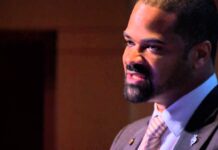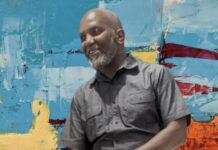In a business world increasingly obsessed with speed, scale, and surface-level insight, Germar Reed is betting on something deeper: clarity. As the founder of District Analyst, Reed didn’t set out to chase trends or dazzle with jargon—he built a company to solve a quiet crisis plaguing boardrooms and startups alike: decision-making without direction. Drawing from years of experience advising billion-dollar companies, Reed launched District Analyst to offer not just data, but discernment. His mission is bold and refreshingly grounded—to make complexity understandable and turn insight into action. In doing so, he’s helping leaders not only to see their numbers but also to understand what those numbers really mean.
TNJ: What inspired you to launch District Analyst?
Reed: I built District Analyst because I was tired of watching business leaders, founders, and executives alike operate in the dark. Tired of hearing brilliant ideas fumble—not because they lacked heart, but because they lacked the hard truths that only good data can surface. I spent years behind closed doors advising companies with billion-dollar balance sheets, and the pattern was always the same: decisions made on instinct, politics, or inertia. District Analyst was born to intervene—not just to deliver reports, but also to deliver clarity. We exist to make complexity understandable and to make insight actionable.
TNJ: Describe the moment when it hit you that there was space—and demand—for the kind of services District Analyst offers.
Reed: It wasn’t one moment. It was a thousand: a VP pulling me aside after a meeting to ask what the numbers really meant; a founder struggling to explain his business model to a potential investor. What was missing wasn’t data—it was translation. District Analyst became that translator. We help leaders see through the fog of metrics, distill signal from noise, and find the story that matters. That demand didn’t come from a market study. It came from being in the room, listening.
TNJ: Entrepreneurship requires vision and execution. How did you begin to build a team or infrastructure around your idea?
Reed: My background is in building data products, guiding analytics strategy, and delivering insights in high-stakes environments. I knew what “good” looked like because I’d seen it under pressure. So when it came time to build a team, I didn’t look for followers. I looked for partners—for people who could carry the weight, challenge assumptions, and deliver work that speaks for itself.
TNJ: What principles guide how you lead?
Reed: I lead with precision and purpose. We don’t build unless it serves a need. We don’t speak unless we’ve listened first.
TNJ: District Analyst has become a brand with influence. What was your strategy for creating an identity that resonates?
Reed: We never wanted to be another firm with a polished deck and buzzwords. Our brand is built on truth and trust. We bring the voice of reason into rooms that are often too loud with opinion. Clients come to us not just for answers, but also for the confidence that comes from knowing those answers are grounded in data and judgment. That’s our identity: a trusted voice, a measured perspective, a sharp eye.
TNJ: Talk about a challenge that tested your resilience as an entrepreneur. How did you push through? What did you learn from the experience?
Reed: There’s always skepticism—especially when your expertise threatens comfort zones. I remember being asked to build a model for a client who had already made up their mind. When the data told a different story, they balked. I could have folded or softened the truth. Instead, I stood on the integrity of the work. And they came back weeks later. That taught me this: if you tell the truth well, and with care, the right people will hear it—even if not right away.
TNJ: How do you balance innovation with consistency in your business model? What does it take to stay relevant while remaining rooted in your mission?
Reed: We innovate through use. Every model we build, every visualization we deliver, has to work in the real world. I’m not interested in shiny dashboards that no one opens. Our consistency comes from focusing on utility. And yes, we explore new tools—machine learning, generative AI—but always with one question in mind: Will this help the client see more clearly? If not, we leave it.
TNJ: How has fatherhood shaped your perspective on entrepreneurship and legacy building?
Reed: Fatherhood taught me that legacy isn’t only what you leave behind—it’s also what you build into others. I watch my daughters rehearse the same steps over and over at dance class—each one closer to grace. That’s how I think of my work: disciplined repetition in pursuit of clarity and excellence. It’s not flashy. It’s deliberate. The same care I take guiding them, I bring to guiding clients.
TNJ: What’s a common mistake that emerging entrepreneurs make? What advice would you give to avoid it?
Reed: Too many entrepreneurs chase vanity metrics. They get caught up in noise—follower counts, page views, headlines—and miss the truth-telling metrics like customer retention. My advice? Know who’s staying, not just who’s showing up. Retention tells you if you’re building something worth coming back to. Everything else is applause. Retention is trust.
TNJ: How do you define success in your work?
Reed: Success isn’t always a number. Sometimes it’s a question asked that wasn’t asked before. Sometimes it’s a client who starts to think differently. We define success by the elevation of thought in the rooms we enter—by how our presence helps others make clearer, braver decisions.
TNJ: What’s next for District Analyst—new industries, partnerships, innovations?
Reed: We’re deepening our work with corporate strategy teams and decision-makers in industries like healthcare and real estate. We’re embedding predictive tools inside the businesses of tomorrow, and we’re partnering with community organizations and private equity firms that are serious about building smart, inclusive ecosystems. The future isn’t more data. It’s better questions—asked sooner.
TNJ: What does being an entrepreneur mean to you in this moment?
Reed: It means being seen. It means telling the truth in rooms that weren’t built for you—and building new rooms when necessary. It means showing up as both expert and advocate.
TNJ: How do you use your platform to create space or opportunity for others?
Reed: I use my platform to hire intentionally, to mentor without ego, and to serve as proof that rigor and representation can coexist.
TNJ: If you could go back and give yourself advice at the very start of this journey, what would you say?
Reed: Trust your expertise. Don’t wait for permission. Don’t dilute your standards. The right clients will value the truth you bring; the wrong ones aren’t your audience.
TNJ: How do you protect your peace, maintain your momentum, and stay inspired while building something larger than yourself?
Reed: I stay close to the work. I mentor. I write. I reflect. I make room for the quiet—because that’s where clarity lives. And I remind myself daily: this isn’t just about data—it’s about helping people to see. And in that seeing, they lead better. That’s enough to keep me going.









